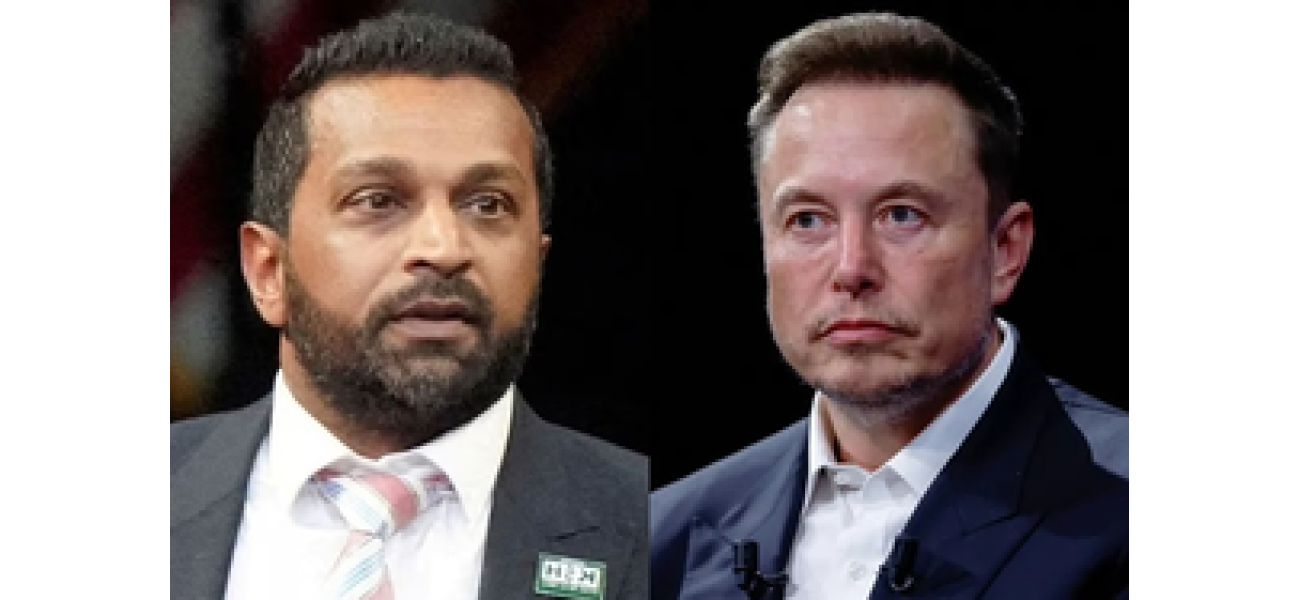Kash Patel and other leaders of important organizations are going against Elon Musk's proposal for widespread layoffs.
Kash Patel and other top US officials are defying Elon Musk's order to send 5 responses or be fired, setting a Monday deadline for 2.5 million employees.
February 24th 2025.

In a bold move, billionaire businessman Elon Musk has issued a deadline for over 2.5 million federal employees to respond to his demand or risk losing their jobs. This directive has sparked defiance from top government officials in sensitive areas, such as investigative, intelligence, defence, and diplomacy, who are refusing to comply with Musk's ultimatum.
Musk's authority in this matter is derived directly from President Donald Trump, who has tasked him with reducing costs and improving efficiency within the federal government. However, if Trump supports Musk, it could lead to a widespread showdown across various departments that are crucial to national security.
Both Musk and Trump are tapping into the general public's skepticism towards bureaucracy and antipathy towards government employees. In a post on social media, Musk expressed his concern that many government employees are not even checking their emails due to their lack of productivity.
However, some officials have pushed back against Musk's demand. Kash Patel, the newly appointed head of the Federal Bureau of Investigation, sent a memo to his employees instructing them not to respond. Similarly, National Intelligence Director Tulsi Gabbard also urged the Intelligence Community to ignore Musk's request, citing the sensitive and classified nature of their work.
Other departments and agencies, including the National Security Agency, the Defence, Homeland Security, and State departments, have also instructed their staff to disregard Musk's demand. The disclosure of their work could compromise ongoing investigations and sensitive cases.
In a show of authority, Patel emphasized that the FBI is responsible for all review processes and will conduct them according to their established procedures. Musk, on the other hand, has not responded to Patel or Gabbard but has threatened to fire anyone with a similar attitude to a Pentagon official who opposes his directive.
Darin Selnick, acting under-secretary for personnel and readiness, has countermanded Musk's demand and instructed federal employees to disregard it. Despite its name, the Department of Government Efficiency (DOGE) does not hold any constitutional or legal standing. Trump has not yet intervened in this matter, but he has praised Musk on social media for his efforts to streamline processes and improve efficiency within the government.
Musk's focus on cutting costs and eliminating inefficiencies has also led to some dismissals that have raised concerns about national security. For instance, the National Nuclear Safety Agency, which manages the nuclear arsenal, had to recall most of the 300 employees who were laid off due to potential threats to national security. In another case, the Food and Drug Administration recalled scientists who were working on Musk's company, Neuralink, as their dismissal could raise suspicions of a conflict of interest.
The courts will ultimately decide the fate of these government employees, and unions have threatened to take legal action. In a temporary reprieve, a judge reversed a restraining order against the firing of USAID employees, which was a relief for the Trump administration.
In conclusion, Musk's demand has sparked defiance from top government officials and raised concerns about national security. While some are supportive of his efforts to streamline processes, others are concerned about the potential consequences of dismissing employees in sensitive areas. The courts and unions will play a crucial role in determining the outcome of this situation.
Musk's authority in this matter is derived directly from President Donald Trump, who has tasked him with reducing costs and improving efficiency within the federal government. However, if Trump supports Musk, it could lead to a widespread showdown across various departments that are crucial to national security.
Both Musk and Trump are tapping into the general public's skepticism towards bureaucracy and antipathy towards government employees. In a post on social media, Musk expressed his concern that many government employees are not even checking their emails due to their lack of productivity.
However, some officials have pushed back against Musk's demand. Kash Patel, the newly appointed head of the Federal Bureau of Investigation, sent a memo to his employees instructing them not to respond. Similarly, National Intelligence Director Tulsi Gabbard also urged the Intelligence Community to ignore Musk's request, citing the sensitive and classified nature of their work.
Other departments and agencies, including the National Security Agency, the Defence, Homeland Security, and State departments, have also instructed their staff to disregard Musk's demand. The disclosure of their work could compromise ongoing investigations and sensitive cases.
In a show of authority, Patel emphasized that the FBI is responsible for all review processes and will conduct them according to their established procedures. Musk, on the other hand, has not responded to Patel or Gabbard but has threatened to fire anyone with a similar attitude to a Pentagon official who opposes his directive.
Darin Selnick, acting under-secretary for personnel and readiness, has countermanded Musk's demand and instructed federal employees to disregard it. Despite its name, the Department of Government Efficiency (DOGE) does not hold any constitutional or legal standing. Trump has not yet intervened in this matter, but he has praised Musk on social media for his efforts to streamline processes and improve efficiency within the government.
Musk's focus on cutting costs and eliminating inefficiencies has also led to some dismissals that have raised concerns about national security. For instance, the National Nuclear Safety Agency, which manages the nuclear arsenal, had to recall most of the 300 employees who were laid off due to potential threats to national security. In another case, the Food and Drug Administration recalled scientists who were working on Musk's company, Neuralink, as their dismissal could raise suspicions of a conflict of interest.
The courts will ultimately decide the fate of these government employees, and unions have threatened to take legal action. In a temporary reprieve, a judge reversed a restraining order against the firing of USAID employees, which was a relief for the Trump administration.
In conclusion, Musk's demand has sparked defiance from top government officials and raised concerns about national security. While some are supportive of his efforts to streamline processes, others are concerned about the potential consequences of dismissing employees in sensitive areas. The courts and unions will play a crucial role in determining the outcome of this situation.
[This article has been trending online recently and has been generated with AI. Your feed is customized.]
[Generative AI is experimental.]
0
0
Submit Comment





